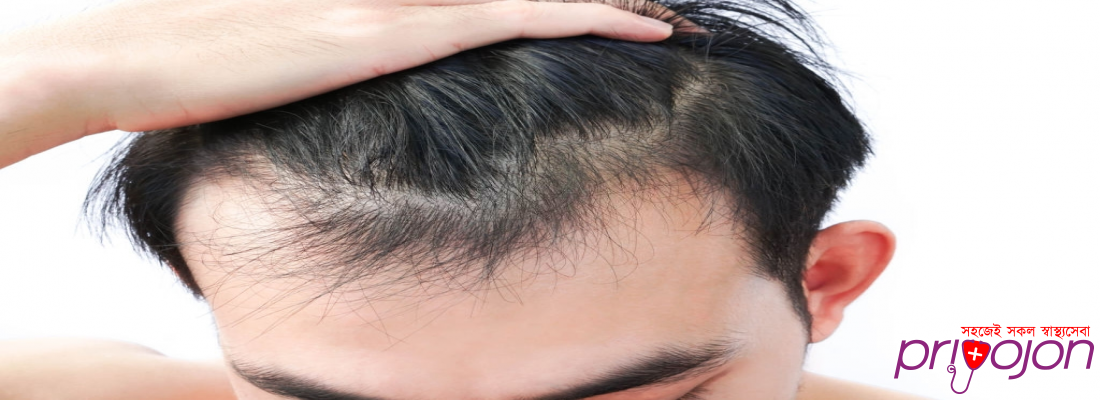Shared on 06-04-2020
Hair Transplant - All You Should Know About It!
Hair Transplant - All You Should Know About It!

What is hair transplant?
Hair transplant is the most common surgical procedure for hair loss today. Hair transplantation is a surgical technique that moves hair follicles from a part of the body called the 'donor site' to a bald or balding part of the body known as the recipient site.
It is primarily used to treat male pattern baldness. In this minimally invasive procedure, grafts containing hair follicles that are genetically resistant to balding, (like the back of the head) are transplanted to the bald scalp.
Types of hair transplantation:
FUT: Skin Strip is taken from the donor area and hair graft extracted from the strip under the microscope and then implanted over Bald area.
FUE: Hair Follicles or grafts are directly extracted from donor area with the help of motorised punches and then implanted over bald area.
Which is the best hair transplant method?
Both the techniques are good. Technique selection depends on the quality of hair in donor area i.e. thickness and density.
Is hair transplantation safe?
Yes, it is safe. The procedure is done under local anesthesia and it is so comfortable that you can watch TV read a book or talk to your friends on the phone while it is being performed.
Will I have any type of scar?
In the donor area, yes. In the path of the incision that was performed to remove the grafts, it can result in a thin and linear scar, which over time is difficult to identify.
If the individual has healing disorders, he or she may have a larger scar which can be minimized with proper treatment. In the receiving area (bald) when surgery is performed with instruments, appropriate appliances and with an experienced professional, this is almost impossible to happen.
The tendency to form scars varies from patient to patient, depending on the type, colour and postoperative care.
In other types of surgery such as Reducing and Patching the scar is visible but can be camouflaged by combing the lateral hair on it, or else, by transplanting hair into it.
Can transplanted hair be treated like normal hair?
Although you must be very gentle for the first week after hair transplant surgery, normal shampooing, brushing and hair care can be resumed after ten days since, by this time, the grafts are firmly in place. You can also have a haircut at this point. There is nothing fragile about the transplanted hair. It behaves exactly the same as the rest of your normal hair.
Can a person's hair be transplanted to another?
Theoretically yes, but in practice, this does not work because to keep this hair alive it is necessary to constantly use medicines with numerous side effects. When it comes to a kidney, a vital organ is worth the risk, but if it is an aesthetic character like hair, it is not advisable.
Can hair transplant be done on a small portion first?
Hair transplantation is a surgical procedure and it is recommended to go forward with it completely after you have confidence in the procedure.
Do grafts get enough blood supply when transplanted in large numbers?
The blood supply of the scalp becomes great that it sustains the growth of the newly transplanted grafts at once. However, if the grafts are too large and the sites are placed too close together, then the blood supply can be hampered which might result in poor growth. Blood flow also gets affected by sun exposure and smoking.
Is it difficult to maintain transplanted hair?
No special maintenance is needed for transplanted hair. They can be washed, combed, oiled, cut and styled normally.
Does implanted hair fall initially?
Yes, initially implanted hair falls. Roots start growing in two months and full growth takes around nine months to one year.
Myth:
There is a myth that the hair transplant may not look natural, which is completely false. If done by an expert surgeon, there is no reason why a hair transplant will not look natural. When an expert handles your hair transplant, they will ensure that each hair follicle is extracted with care. When these follicles are implanted in your scalp, in the direction is made corresponding to the actual hair, ultimately leading to a tandem growth. In addition, the experts will ensure that the scars are minimal or well hidden. With these steps being taken, there is no reason why a hair transplant will not look natural.
How long does a hair transplant procedure take?
A typical session between 3000-3500 grafts normally takes an average of 6 to 7 hours at the surgery on an outpatient basis.
In case you have a concern or query you can always consult a specialist & get answers to your questions!
What is hair transplant?
Hair transplant is the most common surgical procedure for hair loss today. Hair transplantation is a surgical technique that moves hair follicles from a part of the body called the 'donor site' to a bald or balding part of the body known as the recipient site.
It is primarily used to treat male pattern baldness. In this minimally invasive procedure, grafts containing hair follicles that are genetically resistant to balding, (like the back of the head) are transplanted to the bald scalp.
Types of hair transplantation:
FUT: Skin Strip is taken from the donor area and hair graft extracted from the strip under the microscope and then implanted over Bald area.
FUE: Hair Follicles or grafts are directly extracted from donor area with the help of motorised punches and then implanted over bald area.
Which is the best hair transplant method?
Both the techniques are good. Technique selection depends on the quality of hair in donor area i.e. thickness and density.
Is hair transplantation safe?
Yes, it is safe. The procedure is done under local anesthesia and it is so comfortable that you can watch TV read a book or talk to your friends on the phone while it is being performed.
Will I have any type of scar?
In the donor area, yes. In the path of the incision that was performed to remove the grafts, it can result in a thin and linear scar, which over time is difficult to identify.
If the individual has healing disorders, he or she may have a larger scar which can be minimized with proper treatment. In the receiving area (bald) when surgery is performed with instruments, appropriate appliances and with an experienced professional, this is almost impossible to happen.
The tendency to form scars varies from patient to patient, depending on the type, colour and postoperative care.
In other types of surgery such as Reducing and Patching the scar is visible but can be camouflaged by combing the lateral hair on it, or else, by transplanting hair into it.
Can transplanted hair be treated like normal hair?
Although you must be very gentle for the first week after hair transplant surgery, normal shampooing, brushing and hair care can be resumed after ten days since, by this time, the grafts are firmly in place. You can also have a haircut at this point. There is nothing fragile about the transplanted hair. It behaves exactly the same as the rest of your normal hair.
Can a person's hair be transplanted to another?
Theoretically yes, but in practice, this does not work because to keep this hair alive it is necessary to constantly use medicines with numerous side effects. When it comes to a kidney, a vital organ is worth the risk, but if it is an aesthetic character like hair, it is not advisable.
Can hair transplant be done on a small portion first?
Hair transplantation is a surgical procedure and it is recommended to go forward with it completely after you have confidence in the procedure.
Do grafts get enough blood supply when transplanted in large numbers?
The blood supply of the scalp becomes great that it sustains the growth of the newly transplanted grafts at once. However, if the grafts are too large and the sites are placed too close together, then the blood supply can be hampered which might result in poor growth. Blood flow also gets affected by sun exposure and smoking.
Is it difficult to maintain transplanted hair?
No special maintenance is needed for transplanted hair. They can be washed, combed, oiled, cut and styled normally.
Does implanted hair fall initially?
Yes, initially implanted hair falls. Roots start growing in two months and full growth takes around nine months to one year.
Myth:
There is a myth that the hair transplant may not look natural, which is completely false. If done by an expert surgeon, there is no reason why a hair transplant will not look natural. When an expert handles your hair transplant, they will ensure that each hair follicle is extracted with care. When these follicles are implanted in your scalp, in the direction is made corresponding to the actual hair, ultimately leading to a tandem growth. In addition, the experts will ensure that the scars are minimal or well hidden. With these steps being taken, there is no reason why a hair transplant will not look natural.
How long does a hair transplant procedure take?
A typical session between 3000-3500 grafts normally takes an average of 6 to 7 hours at the surgery on an outpatient basis.
In case you have a concern or query you can always consult a specialist & get answers to your questions!
Popular Health Tips
Mr Dr. Kazi Naushad-Un-Nabi
FRCP (Glasgow), MRCP (UK), MRCPCH (UK), DCH (IRE), MBBS (DMC)
15 Years of Experience
What is Hair Loss?
Hair loss, also known as alopecia or baldness, refers to a loss of hair from part of the head or bo...
What is hair transplant?
Medically reviewed by
Mr Dr. Mohammad Toufiq
MBBS (DMC), MD (Shishu)
2 Years of Experience
- Written by the Priyojon Editorial Team

